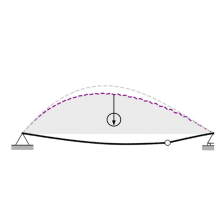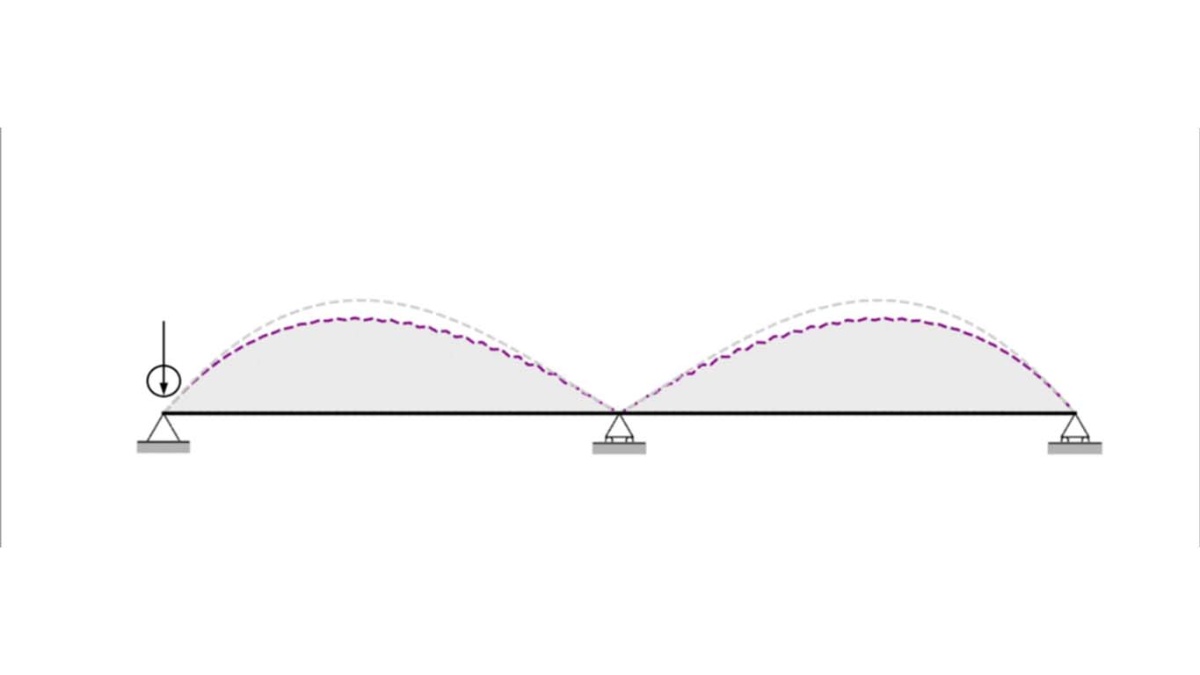Funding Phase II
The subproject investigates the potential of adaptive bridges based on three promising adaptation objectives:
- the subsequent adaptation of existing bridges to extend their service life,
- the adaptation of particularly light bridges with an unfavorable ratio of traffic load to dead weight, also with the aim of extending service life, and
- the adaptation of stiffness-dominated bridge structures to reduce deflections.
The ultimate limit state of the bridges is not directly affected, which is why failure safety is relatively uncritical for dimensioning.
In Germany, there is a great need for rehabilitation and new construction of highway and railroad bridges. Due to the increasing wear caused by heavy goods traffic over the past decades, highway bridges often have only a short service life. Retrofitting actuators can reduce these operational demands and increase service life.
The use of high-performance materials in new bridges reduces the cross-sections and thus the weight of bridge components. The resulting reduction in the ratio of dead weight to live load increases the stress ranges during heavy load crossings and thus fatigue. The targeted application of counterforces by means of actuators can reduce these stress amplitudes and extend service life.
In the case of bridges for high-speed trains, special requirements for deformation limitations cause high material costs. Adaptive bridges can actively reduce deformations during train crossings so that cross-sectional dimensions can be reduced, resources saved and emissions avoided. The results of subprojects B01 and C02 in the first funding period have shown that there is great potential for mass savings through adaptation, especially in stiffness-dominated structures.
The operating principle of integrated fluidic actuators, which can be used to manipulate the load transfer of flexural beams and compensate for deformations, can be transferred to bridges, since here too the load transfer occurs predominantly via bending.
The central questions in subproject C07 are:
- How can existing experience and concepts for the design of adaptive structures be transferred to bridge structures?
- How can the service life of bridges be increased by (subsequent) integration of actuators (adaptation goals 1 and 2)?
- How can bridges be designed with less material while maintaining the same performance through adaptation (adaptation goal 3)?
In addition to the conceptual development of actuated bridge structures, stresses, deformations, natural frequencies, vibration amplitudes and required actuator forces (travel, actuating speed) are computed on the base of structural-mechanical models. The results are validated on a reduced-scale functional model.
Subproject Leader
- Prof. Dr.-Ing. Lucio Blandini, Institute for Lightweight Structures and Conceptual Design
- Prof. Dr.-Ing. Manfred Bischoff, Institute for Structural Mechanics
- Prof. Dr.-Ing. Dr.-Ing. E. h. Dr. h.c. Werner Sobek, Institute for Lightweight Structures and Conceptual Design
Publications
- S. Dakova et al., “A Model Predictive Control Strategy for Adaptive Railway Bridges,” IFAC-PapersOnLine, vol. 56, Art. no. 2, 2023, doi: 10.1016/j.ifacol.2023.10.1170.
- A. P. Reksowardojo and G. Senatore, “Design of ultra-lightweight and energy-efficient civil structures through shape morphing,” Computers & Structures, vol. 289, p. 107149, Dec. 2023, doi: 10.1016/j.compstruc.2023.107149.
- A. Zeller et al., “State Estimation Using Different Disturbance Models for Adaptive Railway Bridges,” IFAC World Congress, Jul. 2023.
- A. Zeller et al., “Bridge State and Average Train Axle Mass Estimation for Adaptive Railway Bridges,” in IEEE Xplore® TMECH-01-2023-14914, Aug. 2023. doi: 10.1109/TMECH.2023.3277317.
- A. P. Reksowardojo, G. Senatore, L. Blandini, and B. manfred, “Vibration control of simply supported beam bridges equipped with an underdeck adaptive tensioning system,” in IABSE, 2022.
Contact

Arka Prabhata Reksowardojo
Dr.-Ing.Research Assistant

Axel Trautwein
M.Sc.Doctoral Researcher




